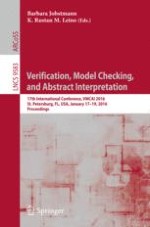This book constitutes the refereed proceedings of the 17th International Conference on Verification, Model Checking, and Abstract Interpretation, VMCAI 2016, held in St. Petersburg, FL, USA, in January 2016. The 24 full papers together with 2 invited talks and 1 abstract presented were carefully reviewed and selected from 67 submissions. VMCAI provides topics including: program verification, model checking, abstractinterpretation and abstract domains, program synthesis, static analysis,type systems, deductive methods, program certification, debugging techniques,program transformation, optimization, hybrid and cyber-physical systems.
